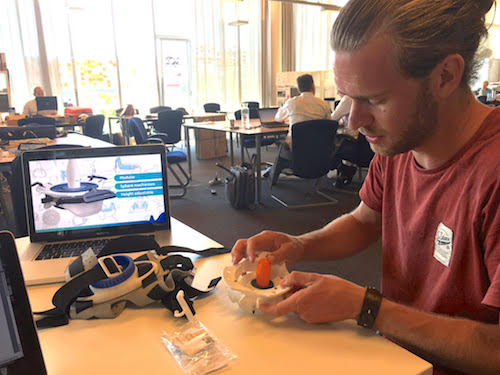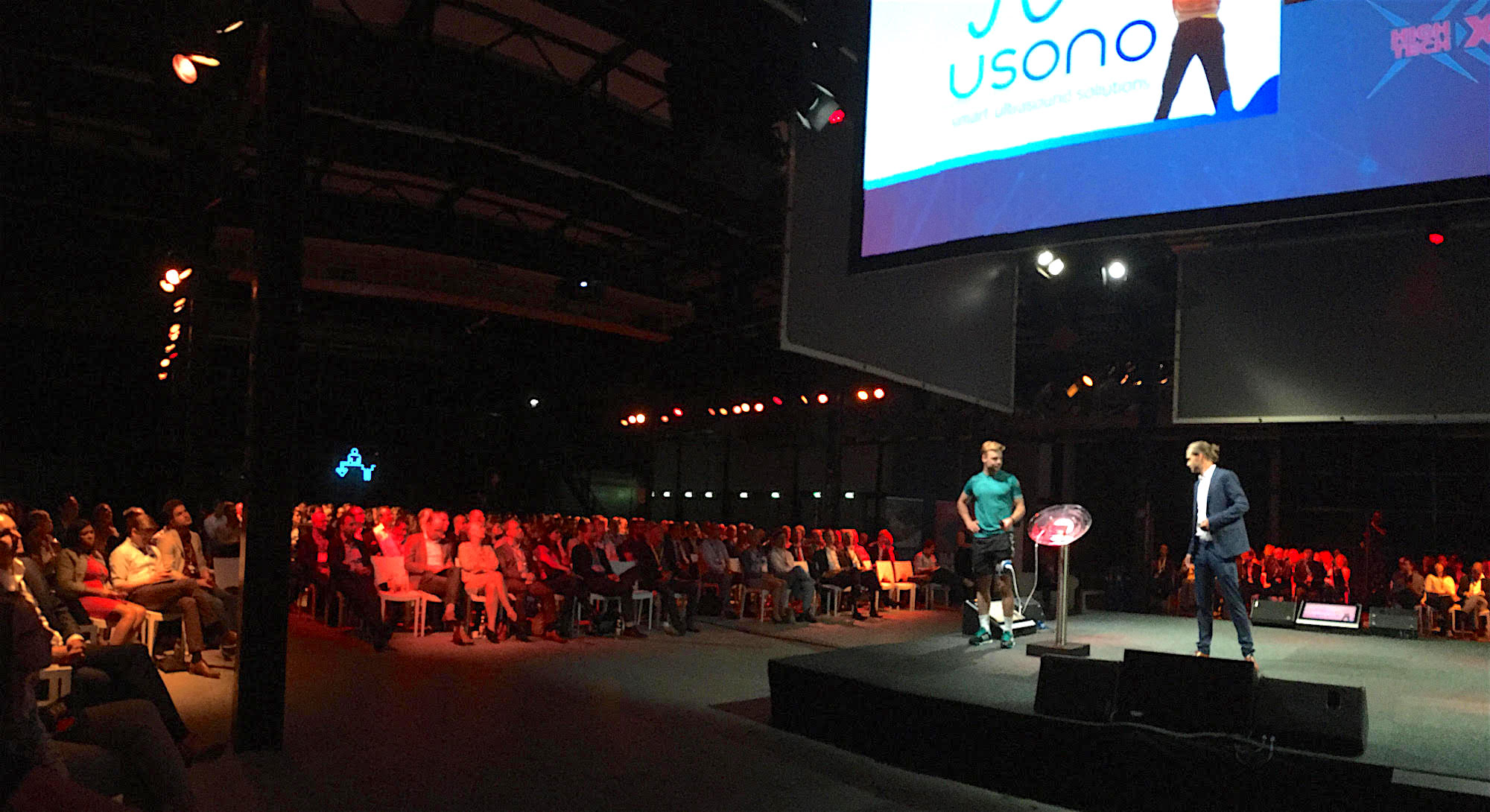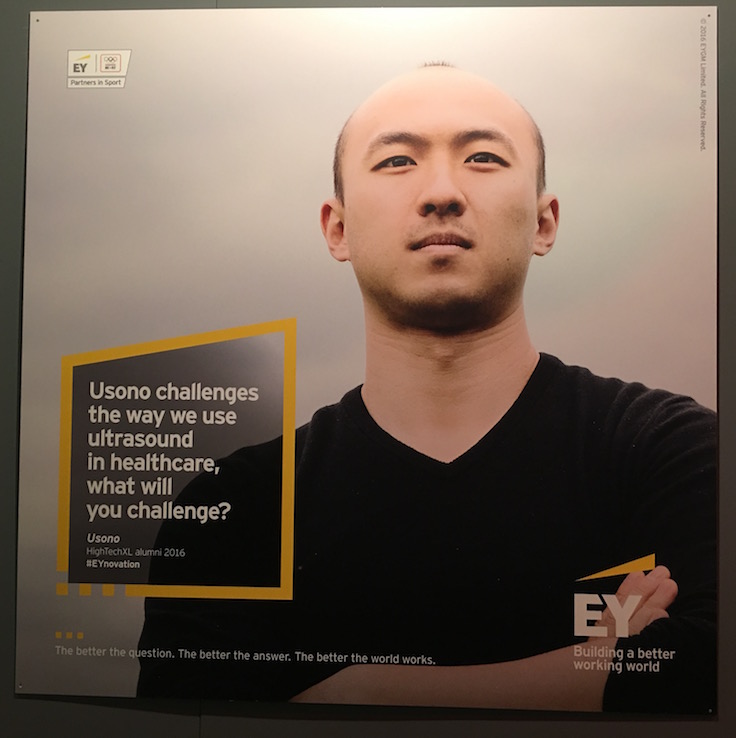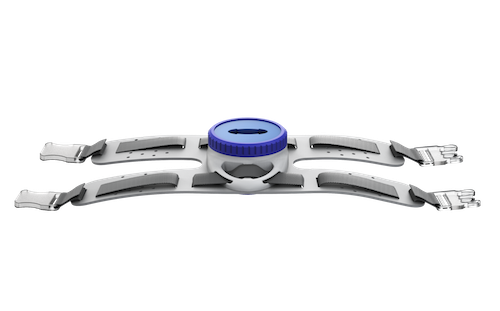To mark the end the HighTech XL hardware accelerator last Thursday, Usono COO Victor Donker donned a headset and mounted a dramatically lit stage in the center of a cavernous events space. Donker used digital displays, video and the high drama of a successful startup to hold 800 tech executives, economic-development officials and potential investors in rapt silence around him.
In short, some significant portion of the audience smells money, because, theoretically at least, every health care system and facility in the world can use what Usono’s selling.
Usono solves a major problem by freeing ultrasound medical testing from current limitations, Donker said in his HighTech XL demo day talk. Technicians typically hold ultrasound scanning devices for long periods of time, which is absurdly inefficient on many levels.
To start with, they can’t get accurate sonogram readings.
Not only that, repetitive motion injuries lead to clinicians themselves needing treatments and to lost productivity for employers. Usono devices attach to the patient, yet are versatile enough to be used in conjunction with – and without interfering with – other monitoring technology during, say, heart catheterization, along with x-rays.
Sports-medicine potential
That’s just the beginning. What if sports teams could use sonograms to monitor athletes and catch developing muscle problems before they become injuries? Donker, during his presentation, brings top Dutch field hockey player and former Olympian Mink van der Weerden to the stage to demonstrate the sports-medicine potential of a new S version of the original ProbeFix device.
In Europe, Berlin, Stockholm and London get all the pub. But if there’s an innovation center with a certain – for lack of a better term – “synergy” right now, it’s the post-industrial Dutch city Eindhoven, where economic-development officials are scrambling to attract more international talent.
In any other market, Usono would be getting headlines. But the startup is very much under the radar here in the southern Netherlands. Which at this stage of the Usono journey might not be such a bad thing.
Medacc now Usono
Last May, we met Donker when his startup was still using the original name of “Medacc,” for “medical accessories.” We’d come to the High Tech Campus skeptical the relentless U.S.-style startup culture is compatible with European culture. Instead, we came away impressed with Medacc and its team, all graduates of Eindhoven Technical University, or TU/e. At the time, co-founders Donker, Benjamin Tchang and Jori Verbeek were just entering the High Tech XL hardware accelerator at High Tech Campus here. Donker and Verbeek are industrial designers, and Tchang is a biomedical engineer on whose research Usono is based.
The project comes out of Tchang’s research on a new ultrasound technique to diagnose children with muscle disease, requiring dynamic measurements with the patient in motion on a bike. “The study was really about using a simple technique to diagnose muscle disease instead of using blood values which require needles,” Tchang told us last May. “The problem that occurred during the study was that I could not stabilize the ultrasound transducer on the body.”
During the five-month accelerator, that effort to adapt deep-tissue sonogram technology to more versatile applications morphed into Usono. The players remain the same, but the products and potential have advanced significantly. The instrument can be used in conjunction with – and without interfering with – other monitoring technology during, say, heart catheterization, along with x-rays.

VICTOR DONKER DEMONSTRATES THE NEW VERSION OF THE PROBEFIX AT HIGHTECH XL OFFICES AT EINDHOVEN’S HIGH TECH CAMPUS.
“We’re running fast,” Donker says. “You come up with new designs and think you’re done. You’re not done. You keep learning.”
Donker’s definition of “running fast” includes:
- Currently raising 250,000 euros for clinical trials, for prototypes and paperwork for CE mark indicating to EU their devices meet the requirements of the EU Medical Devices Directive.
- Raising 550,000 euros for team salaries and adding software engineers, as well as marketing and sales and the start of mass production. In total, they want to raise 800,000 euros “as soon as possible,” Donker said.
- Raising 90,000 euros on Leapfunder to cover salaries, bills for patent applications and other expenses for the next 90 days.
- Projecting Usono will sell more than 1,000 units in 2017 with gross revenue of 2.4 million euros in global sales.
- Getting commitments from six Dutch hospitals to use/test Usono’s new advanced sonogram-based products as they come on the market in multiple iterations, and before they apply for the CE mark.
- Negotiating with Philips, the Amsterdam-based electronics multinational, which is pushing into medtech. They’re also looking now for a distributor to roll out the products globally.
- Adding permanent staffers including product designer Juan Restrepo from Colombia and Natalicio Costa, a former PriceWaterhouseCooper executive in Brazil, as the new head of finance.
We interviewed Donker about 10 days before the accelerator ended. At the HightTechXL offices on the High-Tech Campus, he told us that with the Usono iteration of the startup, everything has changed.
“We totally redesigned the original product,” he said. The original clunky ProbeFix prototype has been discarded in favor of the gleaming white 3-D printed plastic devices that attach more easily to patients and give greater degrees of rotation. On 7 Sept., Usono filed an international patent on their designs.
The startup is pushing into sports medicine with the ProbeFix S, which was a highlight of Donker’s demo day pitch. Usono partners are testing their new ProbeFix S with S.B.V. Excelsior, a professional football club based in Rotterdam,
Usono has added to its support from hospitals in the Netherlands including:
- UMC Utrecht – Diagnostic Echodiagram and Pacemaker Optimization
- St Antonius – Diagnostic Echodiagram
- Catharina Hospital – Catherization Lab
- Maxima Medical Center – Stress Echo
- Rijnstate – Intensive Care Unit
- Erasmus MC – Intensive Care Unit
Now that the accelerator is over, Donker and Co. are focused on moving into their own offices, then taking the capital, experience and new hospital relationships and shaping them into a real company. To scale up, as they say in the startup world. But the core Usono work goes on, Donker said: “Talk to the doctors and take their observations and needs and craft them into products.”
His dream is to build a global company, then “fly around the world and bring out products to every market we can think of.
“That’s the best thing about entrepreneurship. You keep learning.”
As I wrote four months ago, this is a startup culture any American would recognize and embrace … and a city with technology and talent any American counterpart would envy. The question remains, “When will U.S.-based investors start to notice?”
Co-CEO of Dispatches Europe. A former military reporter, I'm a serial expat who has lived in France, Turkey, Germany and the Netherlands.


















